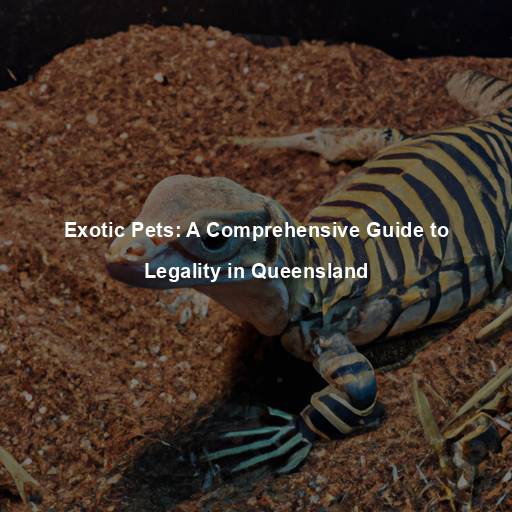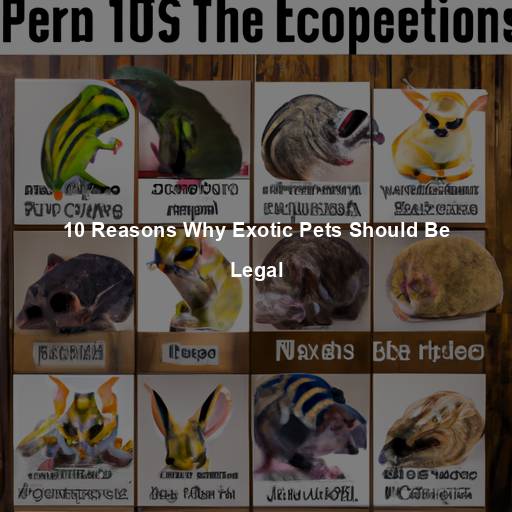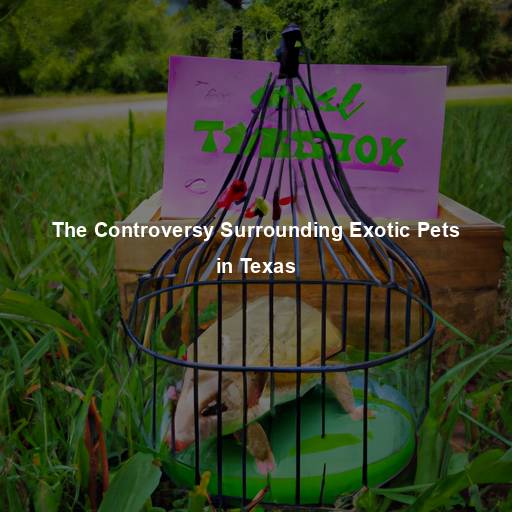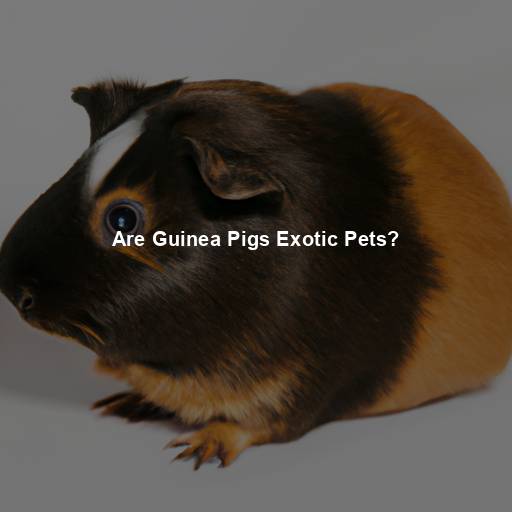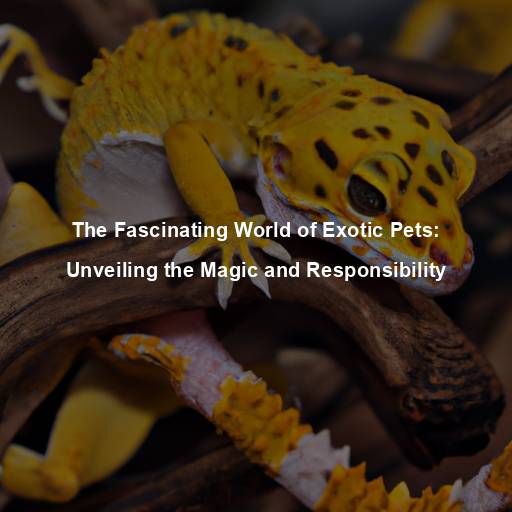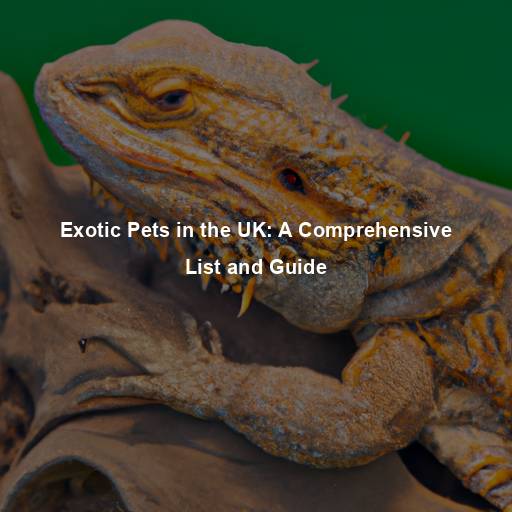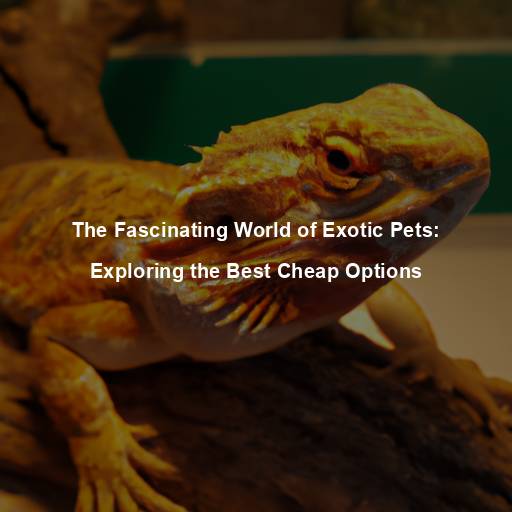Exotic Pets: A Comprehensive Guide to Legality in Queensland
Last Updated on August 3, 2023 by Evan
Contents [hide]
- 1
- 2 Understanding Exotic Pet Legislation
- 3 Exotic Pets: Legal or Restricted?
- 4 Responsible Pet Ownership: Education and Awareness
- 5 Ethical Considerations: Conservation and Preservation
- 6 FAQs: What Exotic Pets are Legal in QLD?
- 6.1 What is considered an exotic pet in Queensland?
- 6.2 Are exotic pets legal to own in Queensland?
- 6.3 What types of exotic pets are legally allowed in Queensland?
- 6.4 Are there any permits or licenses required to own exotic pets in Queensland?
- 6.5 Are there any restrictions on owning venomous or dangerous exotic pets?
- 6.6 Are there any specific guidelines or regulations for the care and welfare of exotic pets in Queensland?
- 6.7 Can I bring an exotic pet into Queensland from another state or country?
- 6.8 Where can I find more information about owning exotic pets in Queensland?
In recent years, the popularity of exotic pets has soared. These unique and fascinating creatures have captivated the hearts of pet enthusiasts around the world. However, it is essential to understand the legalities surrounding exotic pets before bringing one into your home. In this comprehensive guide, we will delve into the regulations and restrictions on exotic pets in Queensland, Australia.
The Fascination with Exotic Pets
For centuries, there has been an inexplicable fascination with exotic pets, captivating the souls of animal enthusiasts across the globe. The indescribable appeal lies in the kaleidoscope of colors, intricate patterns, and mesmerizing behaviors showcased by these extraordinary creatures. From the sinuous dance of a slithering snake, to the resplendent plumage of a magnificent bird, or even the endearing antics of an adorable primate, the allure of these pets knows no bounds. In their presence, an unquenchable thirst for adventure and a tantalizing sense of mystery effortlessly intertwine, leaving our hearts bursting with curiosity and awe.
Understanding Exotic Pet Legislation
The Importance of Legislation
As you venture into the captivating world of exotic pet ownership, it becomes imperative to explore the intricate labyrinth of legalities surrounding these awe-inspiring creatures. These regulations, delicately woven to safeguard the welfare of these remarkable beings, also serve as guardians of public safety and custodians of environmental preservation. Familiarizing oneself with these enigmatic laws becomes an essential pilgrimage, ensuring a harmonious coexistence between humanity and the captivating exotic realm.
Queensland’s Legislation on Exotic Pets
In the enchanting realm of Queensland, where Mother Nature reigns supreme, the laws governing the companionship of otherworldly creatures are shrouded in mystery. Like a dance of cosmic forces, the Nature Conservation Act 1992 and the Biosecurity Act 2014 intricately weave a tapestry of stipulations and curiosities, governing the ownership of exotic pets. Within these arcane texts lies the secret code that defines the specific rites and rituals required to embrace these enigmatic beings, carefully designated as “exotic” or “restricted”. As guardians of the land, it is our duty to honor these enchantments, guarding against the intrusion of interlopers and preserving the delicate equilibrium of our mystical ecosystem.
Exotic Pets: Legal or Restricted?
Reptiles
For decades, reptiles have captivated the hearts of those seeking a touch of the exotic in their lives. In the beautiful region of Queensland, the rules surrounding the ownership of these enigmatic creatures can seem as perplexing as their scaly skin. It’s imperative to navigate the winding path of legality with caution, as the distinction between native and non-native reptiles plays a crucial role in determining their rightful place in our homes. So, tread carefully fellow enthusiasts, for the world of reptile ownership is alluring but sprinkled with bursts of complexity.
Native Reptiles
As a general rule, it is illegal to keep native reptiles as pets without a permit. Queensland has a rich diversity of reptilian species, including various snakes, lizards, and turtles. These animals play vital roles in the ecosystem and are protected by law to ensure their survival. If you encounter a native reptile in need of assistance, it is best to contact a licensed wildlife rehabilitator who can provide proper care.
Non-Native Reptiles
Ever wondered about the captivating world of exotic reptiles? Brace yourself for a wild ride as we delve into the perplexing regulations surrounding these mystical creatures. From Queensland’s legal landscape to the intricate conditions that must be met, this thrilling expedition will leave you bursting with knowledge. Keep your compass pointed towards compliance by exploring the detailed requirements meticulously crafted by the Department of Environment and Science.
Birds
Birds have enchanted humans for centuries with their melodic songs, vibrant plumage, and fascinating behaviors. Queensland allows the keeping of certain species of birds as pets, but it is important to note that native bird species are protected and cannot be kept without a permit.
Native Birds
Did you know that the lovely native birds of Queensland are not just a pretty sight, but also protected by law? Yes, according to the Nature Conservation Act 1992, it’s a big no-no to keep these vibrant feathered friends as pets without the right permission. With their critical role in pollination and seed dispersal, the majestic cockatoos, colorful lorikeets, and the laughter-inducing kookaburras are truly the avian heroes of our region. So, if you happen to stumble upon an injured or orphaned native bird, fret not, as there are licensed wildlife rehabilitators who can provide the expert care these precious creatures need.
Non-Native Birds
When it comes to birds as pets, Queensland has an interesting twist – while some non-native species can legally be kept, it’s crucial to navigate the legal landscape first. The Biosecurity Act 2014 holds the key to this mysterious realm, determining which species can grace your home. For a seamless and worry-free experience, consulting with an avian specialist or reaching out to the Department of Agriculture and Fisheries is highly recommended. Don’t let legality ruffle your feathers – tread the path with confidence!
Mammals
Mammals have an innate ability to form deep bonds with humans, making them popular choices for exotic pet enthusiasts. However, the regulations surrounding the ownership of exotic mammals are stringent in Queensland.
Native Mammals
Did you know that native mammals like kangaroos, wallabies, and possums are actually protected by the Nature Conservation Act 1992? That means they can’t simply be kept as pets without special permits. It’s not just a legal matter, it’s also a matter of their well-being. These creatures have important roles in our ecosystem and need specialized care that most households simply can’t provide.
Non-Native Mammals
The ownership of non-native mammals as pets in Queensland is strictly regulated. The Biosecurity Act 2014 categorizes certain non-native mammals as prohibited or restricted, including primates, foxes, and certain rodent species. It is crucial to review the legislation and seek expert advice before considering the ownership of a non-native mammal.
Public Safety Concerns
While the allure of owning an exotic pet may be enticing, it is essential to consider the potential risks associated with certain species. Exotic animals, by their very nature, may possess unpredictable behaviors or unique needs that can pose a threat to both their owners and the general public.
Escapes and Releases
When it comes to the fascinating world of exotic pets, one cannot ignore the disconcerting issue of potential escapes or deliberate releases into the wild. This certainly raises eyebrows and sets off alarm bells, as it can provoke a cascade of perplexing and far-reaching consequences for local ecosystems. The very idea of these unconventional animals potentially outshining their native counterparts and plunging the delicate harmony of nature into disarray is undeniably worrisome. We can’t turn a blind eye to the ominous threat of exotic pets making an audacious transformation into invasive species that could tip the scales of ecological balance.
Zoonotic Diseases
With the rise in popularity of exotic pets, it’s important to be aware of the potential health risks they may pose. Some of these captivating creatures may carry zoonotic diseases, which can be transmitted to humans. To ensure the well-being of both pet and owner, it is vital to maintain excellent hygiene practices and seek immediate veterinary attention if any signs of illness arise. Stay informed and keep the enchantment of exotic pets alive while prioritizing safety and health.
Enclosure Requirements
When it comes to exotic pets, their housing can be anything but ordinary. These extraordinary creatures demand enclosures that are tailor-made to cater to their whimsical requirements. From sprawling spaces to meticulous control of temperature and humidity, and even incorporating climbing structures or swimming areas, the possibilities are endless. Neglecting to provide their abode with the utmost care can result in a chaotic mix of stress, health complications, and a potential escape plan that could leave you flabbergasted.
Responsible Pet Ownership: Education and Awareness
Importance of Education
Taking proper care of exotic pets is crucial for their well-being and the communities they inhabit. Educating potential owners about their responsibilities, the challenges they may face, and the legal obligations tied to owning such pets is paramount. By fostering awareness, we can help promote a harmonious coexistence between these unique animals and their human caretakers.
Research and Preparation
When pondering the idea of embracing an exotic creature as a furry family member, it becomes absolutely vital to embark on a journey of knowledge and preparedness. Dive deep into the depths of research, uncovering the intricate needs, idiosyncrasies, and potential perils associated with your chosen species. In your quest for understanding, don’t hesitate to seek wisdom from trusted sources, seasoned enthusiasts, and the wise minds of veterinary professionals. Additionally, immerse yourself in the vibrant community of local exotic pet lovers, and let their shared experiences be your guiding light in this perplexing endeavor.
Adoption and Rescue Organizations
Have you ever considered expanding your family to include a truly exotic member? Perhaps it’s time to open your heart and your home to a unique and fascinating creature in need. Through the compassionate act of adopting from a reputable rescue organization or shelter, you can provide a second chance to an extraordinary animal whose life has taken an unexpected turn. By welcoming a rescued exotic pet into your life, you not only gain a loving companion but also contribute to the invaluable efforts of these organizations, whose tireless work revolves around rehabilitating and finding forever homes for these truly exquisite creatures.
Ongoing Veterinary Care
Regular veterinary care is essential for the well-being of any pet, including exotic species. Exotic pets often have specialized veterinary needs, so it is crucial to find a veterinarian with experience in treating and caring for these unique animals. Regular check-ups, vaccinations, and appropriate medical treatments are essential to ensure the health and longevity of your exotic pet.
Responsible Breeding Practices
If you find yourself captivated by the idea of breeding exotic pets, it is of utmost importance to approach this endeavor with a profound sense of responsibility. One cannot simply delve into the world of breeding without a comprehensive understanding of the intricate aspects that shape the biology, genetics, and well-being of these remarkable creatures. By adhering to responsible breeding practices, you actively contribute to the preservation of thriving populations, while also safeguarding genetic diversity. This, in turn, guarantees the physical and emotional welfare of both the parent animals and their precious offspring.
The Dark Side of Exotic Pet Trade
In a world consumed by the seductive charm of owning an unconventional companion, the dark underbelly of the exotic pet trade exposes a web of bustling illegality. This thriving clandestine market not only jeopardizes the very beings it embraces but also throws global biodiversity into a state of turmoil. As responsible custodians of the planet, it is incumbent upon us to fully grasp the far-reaching repercussions of fueling this shadowy industry and fervently dissuade any endorsements of illicitly acquired exotic pets.
Wildlife Trafficking
The awe-inspiring but deeply concerning world of wildlife trafficking unveils a dark and perplexing truth: a clandestine industry that thrives on the exploitation of endangered or protected species in pursuit of unimaginable profits. These majestic creatures, torn from their rightful habitats or subjected to heart-wrenching lives in captivity, become pawns in a high-stakes game driven by the insatiable desire for rare and exotic treasures. This voracious demand wreaks havoc on delicate ecosystems, unraveling the delicate balance of nature and pushing wild populations closer to the brink of extinction. It is a harrowing tale of human greed and a battle against time to protect the vulnerable and restore harmony to our imperiled world.
Environmental Impact
In an increasingly interconnected world, the illicit world of exotic pet trade remains a cause for concern. The grave consequences of this underground industry echo far and wide, leaving an indelible mark on our fragile environment. With unsustainable practices like excessive harvesting and wanton destruction of natural habitats, the delicate balance of ecosystems is thrust into jeopardy, leading to a dire threat to the very survival of targeted species and their delicate abodes. Furthermore, the clandestine introduction of non-native species into local ecosystems via the murky channels of the black market poses a grave danger, unleashing a Pandora’s box of unforeseen impacts on the delicate web of biodiversity and ecological stability.
Animal Cruelty
The path traversed by exotic animals, from their unfortunate capture to the hands of an owner, is a harrowing tale marked by tumultuous suffering. The cruel and deplorable conditions in which they are transported and held during these clandestine trade operations leave them vulnerable to unimaginable stress, painful injuries, and the heart-wrenching finale of untimely death. By inadvertently endorsing the illegal exotic pet trade, we inadvertently perpetuate a vicious cycle of animal cruelty, perpetuating the unabated exploitation of these awe-inspiring creatures.
Ethical Considerations: Conservation and Preservation
Supporting Conservation Efforts
By choosing to support legal and ethical avenues for obtaining exotic pets, individuals can make a positive impact on conservation and preservation efforts. Responsible breeders, reputable pet stores, and adoption organizations play a crucial role in promoting sustainable practices and ensuring the welfare of exotic animals.
Sustainable Breeding Programs
When it comes to safeguarding our planet’s mesmerizing array of wildlife, sustainable breeding programs are a vital ally. These programs work tirelessly to protect endangered or threatened species by embracing ethical breeding practices that emphasize both the well-being of the animals and the preservation of their genetic diversity. By cherishing and supporting these programs, we not only help protect the delicate balance of biodiversity but also pave the way for the continued existence of these remarkable creatures for generations to come.
Education and Awareness
It’s high time we shed light on the pressing issue of conservation and responsible ownership of exotic pets. The urgent need to educate individuals about the grave environmental implications of the black market and the ethical quandaries surrounding these extraordinary creatures cannot be ignored. Only by instilling a deep-seated respect for nature, fostering understanding, and embracing responsible pet ownership, can we hope to pave a path towards a truly sustainable future. Let’s embark on this journey together!
FAQs: What Exotic Pets are Legal in QLD?
What is considered an exotic pet in Queensland?
In the vibrant region of Queensland, the notion of exotic pets veers towards a realm where creatures of non-Australian origins or those uncommonly adopted as companions hold sway. Whether hailing from distant lands or residing within the bounds of this diverse continent yet untouched by domestication, these captivating beings fall into the category of captivating novelties.
Are exotic pets legal to own in Queensland?
Are you curious about the possibility of owning an unconventional furry friend in Queensland? The answer might surprise you – yes, it is indeed legal to have certain exotic pets in this sunny state. However, before you start hopping with excitement, it’s crucial to acknowledge that the Queensland Government has implemented a series of rules and regulations to safeguard the well-being of these extraordinary creatures and preserve the delicate balance of our rich ecosystem. These measures, dictated by the Nature Conservation Act 1992 and the Biosecurity Act 2014, ensure that both animal welfare and environmental concerns are attentively addressed. So, while the idea of sharing your home with a truly unique companion might be tantalizing, it’s essential to tread carefully and abide by these guidelines to ensure a harmonious coexistence.
What types of exotic pets are legally allowed in Queensland?
Discover the fascinating world of legal, exotic pets in sunny Queensland! From the enchanting realm of reptiles, where turtles and lizards (excluding venomous individuals) reign supreme, to the serpentine wonders that slither their way into our hearts (again, excluding venomous ones), the options seem as boundless as the great Australian Outback. But hold on, there’s more! Feast your eyes on the vibrant plumage of parrots and finches, or dive beneath the surface to glimpse the captivating fish, amphibians, rodents, and invertebrates that add a touch of otherworldliness to our homes. Embrace the allure of these extraordinary companions, but do tread carefully, as each species brings its own set of requirements and regulations to navigate.
Are there any permits or licenses required to own exotic pets in Queensland?
Owning exotic pets in Queensland can be quite the adventure, with permits and licenses throwing a dash of unpredictability into the mix. The rules and regulations surrounding these unique creatures can leave even the most seasoned pet owner feeling perplexed. From companion animal permits for reptiles like non-venomous snakes and lizards to recreational wildlife licenses for those captivating exotic birds, it’s a wild world out there. To navigate through this bewildering jungle of paperwork, reaching out to the Queensland Government’s Department of Environment and Science or seeking guidance from a local veterinarian will surely lead you to the answers you seek.
Are there any restrictions on owning venomous or dangerous exotic pets?
Yes, it is illegal to keep venomous snakes, crocodiles, or any dangerous species as pets in Queensland without obtaining a specialized license or permit. The handling and ownership of these animals are strictly regulated due to safety concerns and the potential risk they pose to humans and the environment. The Queensland Government restricts ownership of such species to licensed professionals, such as zoos, wildlife sanctuaries, or appropriately trained and licensed individuals.
Are there any specific guidelines or regulations for the care and welfare of exotic pets in Queensland?
Queensland, the land of exotic possibilities, proudly prioritizes the welfare and conservation of its extraordinary pet residents. Embracing a more enigmatic path, the guidelines dance with vivacity, teasing out the secrets of appropriate housing, nutrition, and health care in a harmonious symphony of responsible ownership practices. A curious explorer would be wise to traverse the tangled maze of these intriguing regulations, ensuring that their exotic companion is nurtured with a bespoke blend of affection and paramount well-being.
Can I bring an exotic pet into Queensland from another state or country?
Bringing an exotic pet into Queensland from another state or country may require additional permits or licenses. The importation of animals is regulated to prevent the introduction of pests, diseases, or invasive species that could harm the local ecosystem. It is essential to contact the relevant authorities, such as the Queensland Department of Agriculture and Fisheries, to obtain the necessary information and permits before transporting an exotic pet across borders.
Where can I find more information about owning exotic pets in Queensland?
If you’re interested in owning an exotic pet in Queensland, it’s important to navigate the labyrinth of regulations and guidelines. Thankfully, the Queensland Government’s official website is a treasure trove of information. From permits to welfare guidelines, their comprehensive resources are sure to quell any perplexity you may have. And for species-specific advice, don’t hesitate to consult with knowledgeable local veterinarians who specialize in the enigmatic world of exotic pets.

